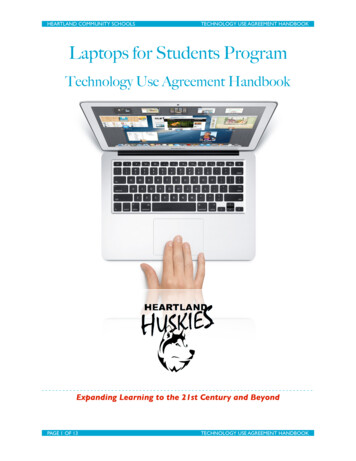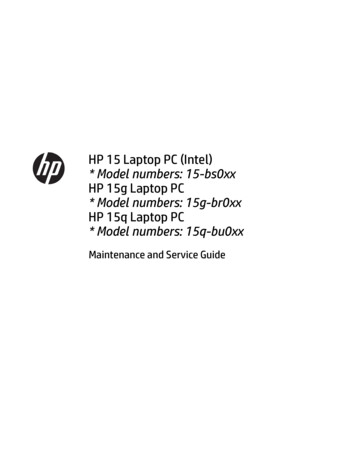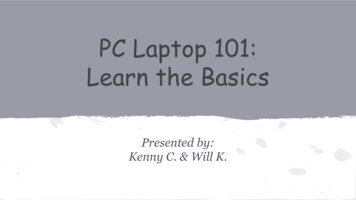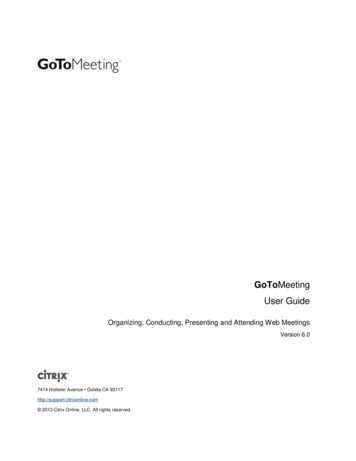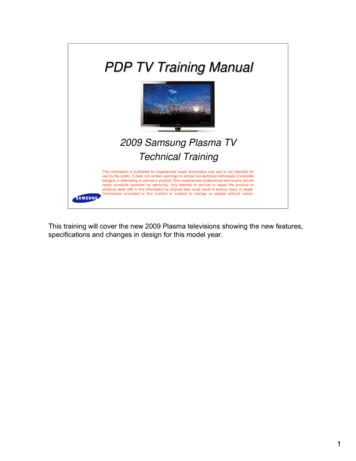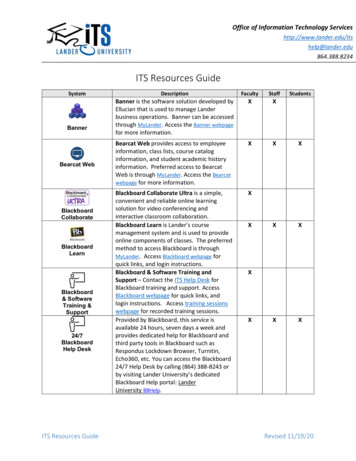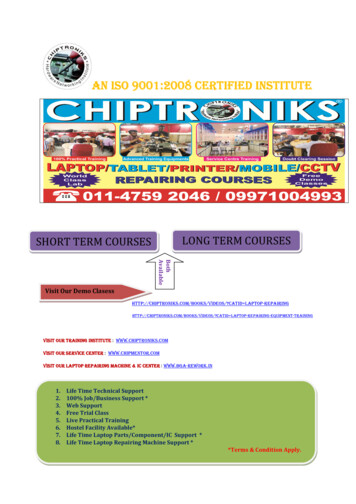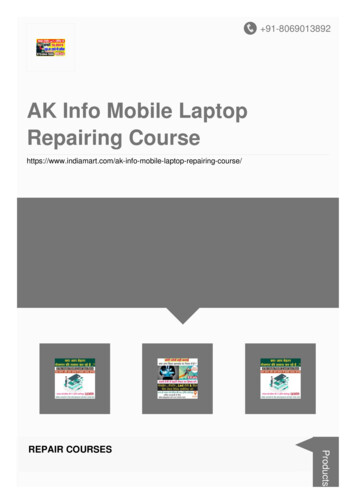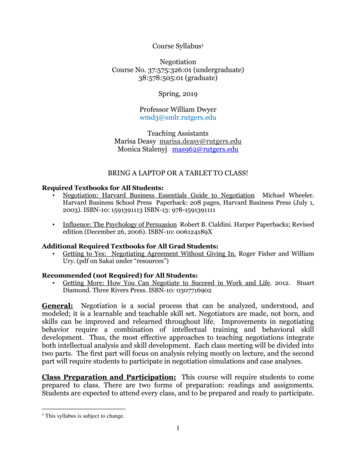
Transcription
Course Syllabus1NegotiationCourse No. 37:575:326:01 (undergraduate)38:578:505:01 (graduate)Spring, 2019Professor William Dwyerwmd3@smlr.rutgers.eduTeaching AssistantsMarisa Deasy marisa.deasy@rutgers.eduMonica Stalenyj mas962@rutgers.eduBRING A LAPTOP OR A TABLET TO CLASS!Required Textbooks for All Students: Negotiation: Harvard Business Essentials Guide to Negotiation Michael Wheeler.Harvard Business School Press Paperback: 208 pages, Harvard Business Press (July 1,2003). ISBN-10: 1591391113 ISBN-13: 978-1591391111 Influence: The Psychology of Persuasion Robert B. Cialdini. Harper Paperbacks; Revisededition (December 26, 2006). ISBN-10: 006124189XAdditional Required Textbooks for All Grad Students: Getting to Yes: Negotiating Agreement Without Giving In. Roger Fisher and WilliamUry. (pdf on Sakai under “resources”)Recommended (not Required) for All Students: Getting More: How You Can Negotiate to Succeed in Work and Life. 2012. StuartDiamond. Three Rivers Press. ISBN-10: 0307716902General: Negotiation is a social process that can be analyzed, understood, andmodeled; it is a learnable and teachable skill set. Negotiators are made, not born, andskills can be improved and relearned throughout life. Improvements in negotiatingbehavior require a combination of intellectual training and behavioral skilldevelopment. Thus, the most effective approaches to teaching negotiations integrateboth intellectual analysis and skill development. Each class meeting will be divided intotwo parts. The first part will focus on analysis relying mostly on lecture, and the secondpart will require students to participate in negotiation simulations and case analyses.Class Preparation and Participation: This course will require students to comeprepared to class. There are two forms of preparation: readings and assignments.Students are expected to attend every class, and to be prepared and ready to participate.1This syllabus is subject to change.1
The grading relies heavily on the assignments. Students should complete all readingsand assignments on time. Late assignments will receive 50% grade reductions.Readings have been assigned to provide an understanding of activities just completed inclass, or to set the stage for upcoming activities. A blend of readings have been selectedthat combine analysis with detailed examples and applications. Students will beresponsible for completing the reading assignments.Assignments are cases, exercises, role-plays, and questionnaires that must be completedfor class, or in between class periods. It is essential that students be prepared byreading the assigned case or briefing information and completing the requiredassignment or write-up.Grading:Assignments, Preparations and Role Play Write-upsMidterm ExamFinal Exam1/31/31/3Students are expected to be prepared for class, to attend every class, and to complete therequired negotiation simulation exercises and write-ups. Most of the exercises will havea written preparation form and a debrief form for you to submit.Office Hours: Students are strongly encouraged to take advantage of meeting todiscuss any matters of concern or interest. I am available to meet in my office at theLabor Education Center on the Cook/Douglass Campus most weekdays by appointment.Schedule of classes:Class 1: Introduction to Negotiations Review of Syllabus Exercise: The Employee Exit Interview Assignment 1:o Bargaining for Advantage, G. Richard Shell, Bargaining Styles AssessmentToolo Submit results for exercise: The Employee Exit Interviewo Read Harvard Business Essentials Guide to Negotiation, Introduction,Chapters 1, 2 and 3Class 2: Distributive and Integrative Negotiations Debrief: The Employee Exit Interview Review Harvard Business Essentials Guide to Negotiation, Introduction,Chapters 1, 2 and 3 Exercise: Used Porsche2
Assignment 2:o Read The Psychology of Persuasion, Robert B. Cialdini, Chapters 1 & 2o Read BATNA Basics posted on Sakai under “Assignments”o Submit results of Porsche sale/purchase negotiation exerciseClass 3: Weapons of Influence Debrief: Used Porsche exercise Review The Psychology of Persuasion, Robert B. Cialdini, Chapters 1 & 2 Exercise: Shoe repair shop sale negotiation Assignment 3:o Submit results for shoe repair shop negotiation exerciseo Read Harvard Business Essentials Guide to Negotiation, Chapters 4 and 5Class 4: Table Tactics Debrief: Shoe repair shop sale negotiation Review Harvard Business Essentials Guide to Negotiation, Chapters 4 and 5 Exercise Pemberton's dilemma (group 1) Assignment 4:o Submit results of Pemberton’s dilemma negotiation exercise (group 1)o Read Harvard Business Essentials Guide to Negotiation, Chapters 6 and 7Class 5: Barriers, Problems, and Mental Errors in Reaching an Agreement Review Harvard Business Essentials Guide to Negotiation, Chapter 6 and 7 Exercise Pemberton's dilemma (group 2) Assignment 5:o Submit results of Pemberton’s dilemma negotiation exercise (group 2)Class 6: Empathy Debrief: Pemberton's dilemma Review Harvard Business Essentials Guide to Negotiation, Chapter 6 and 7(continued) Review for the midterm exam Exercise: “hoop dreams” Assignment 6:o Submit results for “hoop dreams” negotiation exerciseo Study for the midterm examClass 7: MIDTERM EXAM Assignment 7:o Read Harvard Business Essentials Guide to Negotiation, Chapters 8 and 9Class 8: Building Relationships and Representing Others Debrief “hoop dreams” negotiation exercise3
Review Harvard Business Essentials Guide to Negotiation, Chapters 8 and 9Review of midterm exam resultsExercise: BeautiLawn job assignment negotiationAssignment 8:o Submit results of BeautiLawn negotiation exerciseo Read Harvard Business Essentials Guide to Negotiation, Chapter 10Class 9: Foundations of Effective Negotiation Debrief BeautiLawn job assignment negotiation Review Harvard Business Essentials Guide to Negotiation, Chapter 10 Exercise: WROX and Bob Esposito disciplinary action negotiation Assignment 9: Submit results of WROX and Bob Esposito disciplinary action negotiationexercise Read The Psychology of Persuasion, Robert B. Cialdini, Chapter 3(Commitment and Consistency) Read the summary of the book, “Getting to Yes” that is posted on Sakaiunder “assignments”Class 10: Getting To Yes Debrief WROX and Bob Esposito disciplinary action negotiation Review The Psychology of Persuasion, Robert B. Cialdini, Chapter 3(Commitment and Consistency) Review Getting To Yes, Fischer and Ury Exercise: Tamarack vs. Twin City Mining Co. Assignment 10: Submit results of Tamarack vs. Twin City Mining Co. negotiation exercise Read The Psychology of Persuasion, Robert B. Cialdini, Chapter 5 (Liking) Read, “Interests, Rights and Power – Three Ways to Resolve Disputes”posted on SakaiClass 11: Interests, Rights & Power Debrief: Tamarack vs. Twin City Mining Co. Review The Psychology of Persuasion, Robert B. Cialdini, Chapter 5 (Liking) and“Interests, Rights and Power – Three Ways to Resolve Disputes” posted on Sakai Exercise: Harvard Law School drug testing negotiation Assignment 11: Submit results of Harvard Law School drug testing negotiation exerciseClass 12: Multiparty Negotiation (cont’d) Debrief: Harvard Law School drug testing negotiation Review negotiating a job offer Exercise: Pasta Wars part I Assignment 12a:4
o Submit results of Pasta Wars negotiation exerciseClass 13: “Moves and Turns” negotiation analysis Review negotiating a job offer Exercise: Pasta Wars part II Assignment 12b:o Submit results of Pasta Wars negotiation exerciseClass 14: Wrap-up Course Summary Final Exam Review Debrief: Pasta Wars Assignment 13:o Study for the final examClass 15: Final ExamLearning Objectives. The student is able to:Labor Studies and Employment Relations Department: Apply employment relations concepts, and substantive institutional knowledge,to understanding contemporary developments related to work. (Goal 2). Work productively in teams, in social networks, and on an individual basis (Goal13).School of Management and Labor Relations: VI. Application – Demonstrate an understanding of how to apply knowledgenecessary for effective work performance Applying negotiating skills effectively isessential in employment relations, not only in collective bargaining, but also inthe course of many organizational activities. VII. Professional Development – Demonstrate an ability to interact with andinfluence others in a professional manner, and to effectively present ideas andrecommendations Superior negotiators interact with and influence others in aprofessional mannerAdditional Course Objective(s) from the Instructor:Demonstrate an understanding of key concepts including distributive and integrativebargaining, selecting the optimal bargaining style in accordance with the dual concernsframework, and effective preparation for negotiations.Rutgers University welcomes students with disabilities into all of the University's educational programs. Inorder to receive consideration for reasonable accommodations, a student with a disability must contactthe appropriate disability services office at the campus where you are officially enrolled, participate in anintake interview, and provide documentation: delines.If the documentation supports your request for reasonable accommodations, your campus’s disabilityservices office will provide you with a Letter of Accommodations. Please share this letter with yourinstructors and discuss the accommodations with them as early in your courses as possible. To begin this5
process, please complete the Registration form on the ODS web siteat: .Revised 12/5/186
Influence: The Psychology of Persuasion Robert B. Cialdini. Harper Paperbacks; Revised edition (December 26, 2006). ISBN-10: 006124189X Additional Required Textbooks for All Grad Students: Getting to Yes: Negotiating Agreement Without Giving In. Roger Fisher and William Ury. (pdf on Sakai under "resources")
